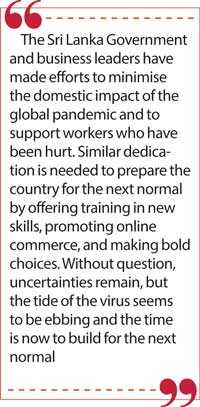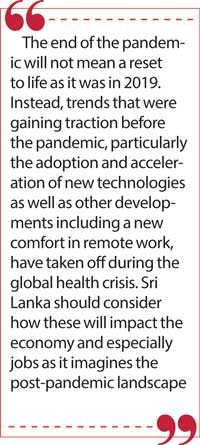Monday Feb 16, 2026
Monday Feb 16, 2026
Wednesday, 28 April 2021 00:00 - - {{hitsCtrl.values.hits}}

With COVID-19 vaccines making the rounds globally, the end of the pandemic may seem near for some.
some.
While in Sri Lanka and elsewhere it’s still too early to sound the all clear – new variants, possible vaccine side effects, rising case numbers in India and distribution snags have added uncertainty to any prediction – it’s not too early to think about how life, economies, and individual choices have changed as a result of the global health crisis.
The end of the pandemic will not mean a reset to life as it was in 2019. Instead, trends that were gaining traction before the pandemic, particularly the adoption and acceleration of new technologies as well as other developments including a new comfort in remote work, have taken off during the global health crisis. Sri Lanka should consider how these will impact the economy and especially jobs as it imagines the post-pandemic landscape.
COVID-19 has exacted a heavy toll on the island nation. By mid-April 2021, the country had recorded about 94,000 confirmed cases and about 600 deaths. Daily new cases hit a peak in mid-February but have declined since. Also, over the past three months, almost a million doses of vaccine have been administered in the country.
While each case is an individual tragedy, Sri Lanka and the rest of Asia reported relatively low infection rates. Rates in Europe, for example, were about 10 times higher. In some countries, early interventions were one of the reasons for the relatively low infection rates in Asia.
Employment patterns inform the impact. Workers whose jobs necessitate close contact to others – colleagues or customers – will face greater disruption because of COVID-19. This includes, for instance, restaurant and hotel staff, barbers and beauticians, and shop clerks. Conversely, those with outdoor work – construction workers, farmers, and the like – could be less affected.
This presents a mixed bag for Sri Lanka. About a quarter of the population works in agriculture, an industry with a relatively muted impact, roughly in line with the world average and levels seen in China and below the 43% seen in India. Meanwhile, developed countries like the United States, Germany, and Australia have less than 5% of their workforce in agriculture. A McKinsey study found that partly because of this job structure, labour displacement brought about by the pandemic in Asia will be about half that expected in developed countries.
At the same time, however, Sri Lanka has about half a million people working directly or indirectly in the tourism industry, which was gutted by the pandemic. Closed borders in 2020 brought foreign arrivals that year to about 508,000, barely a quarter the arrivals seen in 2019.
tourism industry, which was gutted by the pandemic. Closed borders in 2020 brought foreign arrivals that year to about 508,000, barely a quarter the arrivals seen in 2019.
Prospects for 2021 are slightly better, but still grim for the industry. The large proportion of workers in tourism and other service industries made the country more susceptible to job disruption, compounded by the likelihood that business travel will be slow to recover and automation will impact many service-oriented roles.
Against this background and even amid the continuing uncertainties surrounding vaccines, public and private sector leaders in Sri Lanka should consider the changes that will punctuate the post-pandemic period; the next normal. Assuming a return to business-as-usual in pre-pandemic conditions is unrealistic; doing so will forfeit real value and, perhaps most worrying, could delay economic recovery.
A clear change is speedier adoption of new technologies. Automation – processes guided by artificial intelligence – and other digital innovations were embraced in all industries to mitigate the impact of COVID-19. An additional momentum to the shift, remote work, rapidly became a part of most business models.
Economies like Sri Lanka’s that have a heavy proportion of jobs that require on-site manual labour will witness a blunted impact from the tendency toward remote work but will still feel the shift. For instance, even before the pandemic, John Keells Holdings, Sri Lanka’s largest listed company, had begun implementing digital collaboration tools that helped prepare them for new working conditions.
E-commerce is also gaining a firmer foothold as individuals in lockdown turned online for food, supplies, and entertainment. In China, for instance, we found that in the first half of 2020, four e-commerce and delivery companies added 5.1 million new jobs, taking up workers displaced by the pandemic. Companies have also hastened the development of an online presence, and start-ups have moved to fill the gap.
Providore, in Sri Lanka, teamed up with tech companies in 2021 to offer online purchases of groceries and other household items featuring digital advances such as real-time stock availability. Companies should take advantage of this momentum to create value by focusing on customer needs, being willing to test new ideas, accept some failures and responding quickly to changes in market behaviour.
The labour shift especially affects low-skill, low-pay workers, but also impacts mid-level positions. In India, for example, McKinsey research suggests the share of lowest paying jobs in the labour market will fall by six percentage points by 2030, while the highest paying jobs, such as those in healthcare, engineering, and science, will continue to grow. Also, more and more workers will need at least rudimentary computer and digital skills, even if their jobs are not directly related to technology.
This requires teaching workers new skills. Those impacted by advanced technologies and those whose roles now include some computer use must be prepared for these changes to remain productive. Already before the pandemic, an imbalance between skills available and those needed by industry was apparent. The pandemic has widened the gap.
apparent. The pandemic has widened the gap.
For instance, in India, the total hours worked in manual labour is expected to drop by 2.2%, while those needing technical skill should rise by 3.3%. Sri Lanka should prepare for a similar shift.
In the new environment, companies seeking to create the most value must be willing to make bold choices. McKinsey research on corporate success following previous downturns found that those with an all-in strategy and imagined a complete transition posted the greatest successes during the recovery.
In today’s context, this would encompass embracing new technologies such as automation and artificial intelligence. While such moves entail risks, these can be minimised by understanding the full potential of portfolio adjustments and performance efforts and the interrelationships amongst various efforts, as well as the impact of how the changes are timed.
The Sri Lanka Government and business leaders have made efforts to minimise the domestic impact of the global pandemic and to support workers who have been hurt. Similar dedication is needed to prepare the country for the next normal by offering training in new skills, promoting online commerce, and making bold choices. Without question, uncertainties remain, but the tide of the virus seems to be ebbing and the time is now to build for the next normal.
(Ganaka Herath is Managing Partner at McKinsey Sri Lanka. Vidhya Ganesan is Partner at McKinsey Sri Lanka.)